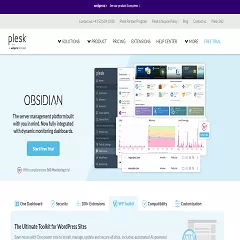Plesk 
Plesk is used by 1.29% of sites
Official Website
https://www.plesk.com/Category
Hosting Panels
Plesk is a web hosting control panel that simplifies the management and administration of websites, servers, and hosting accounts. It provides a user-friendly interface and a range of tools to streamline the management of web hosting services and facilitate website deployment and maintenance.
Key features and functionalities of Plesk include:
Server Management: Plesk allows users to manage their server configurations, including setting up domains, managing DNS records, and configuring email accounts. It provides a centralized platform for server administration tasks.
Website Management: Plesk enables users to manage multiple websites and domains from a single interface. Users can easily create and manage websites, install popular web applications and content management systems (CMS), manage website files, and configure security settings.
User and Account Management: Plesk offers user and account management capabilities, allowing administrators to create and manage customer accounts, set up permissions and access levels, and allocate resources to different hosting accounts.
Security and Firewall: Plesk includes built-in security features to protect websites and servers. It offers tools for managing SSL certificates, setting up firewalls, and implementing security measures to safeguard websites from potential threats and vulnerabilities.
Database Management: Plesk provides tools for managing databases, including creating and managing MySQL and PostgreSQL databases, configuring database users and permissions, and performing database backups and restores.
Email and Collaboration: Plesk offers email management features, allowing users to create and manage email accounts, set up email forwarding and autoresponders, and configure spam filters. It also supports collaboration tools such as calendar and contact management.
Application Deployment: Plesk simplifies the deployment of web applications by providing one-click installation options for popular CMS platforms, e-commerce solutions, and other web applications. This streamlines the process of setting up and managing websites.
Extensions and Integrations: Plesk supports a wide range of extensions and integrations, allowing users to extend the functionality of their hosting environment. This includes integrations with popular web services, security tools, analytics solutions, and more.
Plesk is compatible with various operating systems, including Windows and Linux distributions. It is commonly used by web hosting companies, system administrators, and website owners who seek an intuitive and feature-rich control panel to manage their hosting infrastructure and websites.
Key features and functionalities of Plesk include:
Server Management: Plesk allows users to manage their server configurations, including setting up domains, managing DNS records, and configuring email accounts. It provides a centralized platform for server administration tasks.
Website Management: Plesk enables users to manage multiple websites and domains from a single interface. Users can easily create and manage websites, install popular web applications and content management systems (CMS), manage website files, and configure security settings.
User and Account Management: Plesk offers user and account management capabilities, allowing administrators to create and manage customer accounts, set up permissions and access levels, and allocate resources to different hosting accounts.
Security and Firewall: Plesk includes built-in security features to protect websites and servers. It offers tools for managing SSL certificates, setting up firewalls, and implementing security measures to safeguard websites from potential threats and vulnerabilities.
Database Management: Plesk provides tools for managing databases, including creating and managing MySQL and PostgreSQL databases, configuring database users and permissions, and performing database backups and restores.
Email and Collaboration: Plesk offers email management features, allowing users to create and manage email accounts, set up email forwarding and autoresponders, and configure spam filters. It also supports collaboration tools such as calendar and contact management.
Application Deployment: Plesk simplifies the deployment of web applications by providing one-click installation options for popular CMS platforms, e-commerce solutions, and other web applications. This streamlines the process of setting up and managing websites.
Extensions and Integrations: Plesk supports a wide range of extensions and integrations, allowing users to extend the functionality of their hosting environment. This includes integrations with popular web services, security tools, analytics solutions, and more.
Plesk is compatible with various operating systems, including Windows and Linux distributions. It is commonly used by web hosting companies, system administrators, and website owners who seek an intuitive and feature-rich control panel to manage their hosting infrastructure and websites.